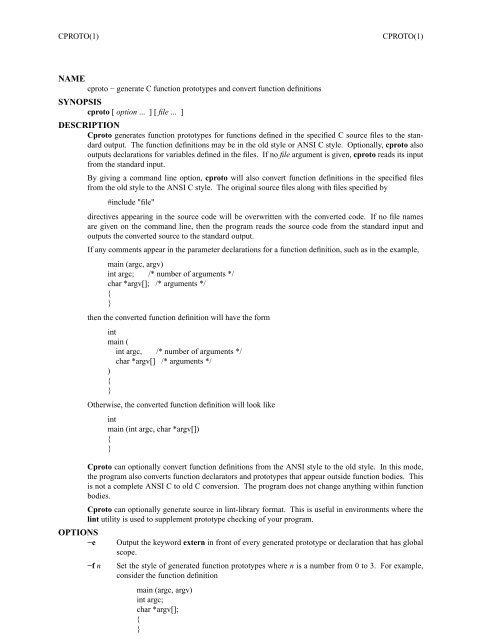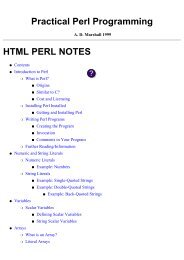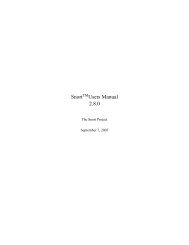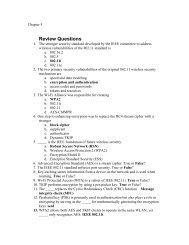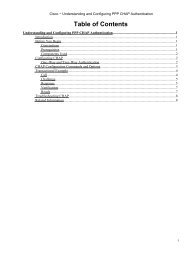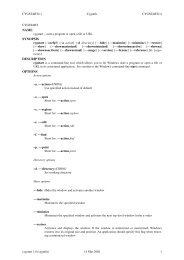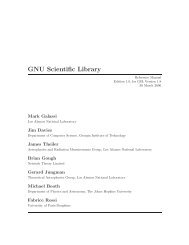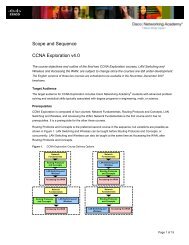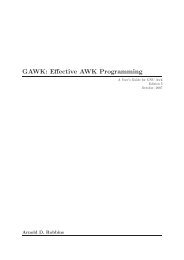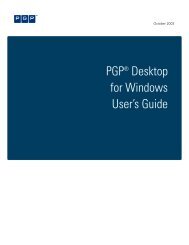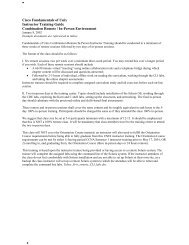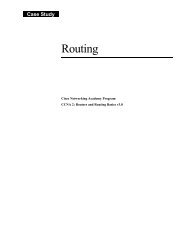NAME SYNOPSIS DESCRIPTION OPTIONS
NAME SYNOPSIS DESCRIPTION OPTIONS
NAME SYNOPSIS DESCRIPTION OPTIONS
Create successful ePaper yourself
Turn your PDF publications into a flip-book with our unique Google optimized e-Paper software.
CPROT O(1)CPROT O(1)<strong>NAME</strong>cproto − generate C function prototypes and convert function definitions<strong>SYNOPSIS</strong>cproto [ option ... ] [ file ... ]<strong>DESCRIPTION</strong>Cproto generates function prototypes for functions defined in the specified C source files to the standardoutput. The function definitions may be in the old style or ANSI C style. Optionally, cproto alsooutputs declarations for variables defined in the files. If no file argument is given, cproto reads its inputfrom the standard input.<strong>OPTIONS</strong>−eBy giving a command line option, cproto will also convert function definitions in the specified filesfrom the old style to the ANSI C style. The original source files along with files specified by#include "file"directives appearing in the source code will be overwritten with the converted code. If no file namesare given onthe command line, then the program reads the source code from the standard input andoutputs the converted source to the standard output.If any comments appear in the parameter declarations for a function definition, such as in the example,main (argc, argv)int argc; /* number of arguments */char *argv[]; /* arguments */{}then the converted function definition will have the formintmain (int argc, /* number of arguments */char *argv[] /* arguments */){}Otherwise, the converted function definition will look likeintmain (int argc, char *argv[]){}Cproto can optionally convert function definitions from the ANSI style to the old style. In this mode,the program also converts function declarators and prototypes that appear outside function bodies. Thisis not a complete ANSI C to old C conversion. The program does not change anything within functionbodies.Cproto can optionally generate source in lint-library format. This is useful in environments where thelint utility is used to supplement prototype checking of your program.−f nOutput the keyword extern in front of every generated prototype or declaration that has globalscope.Set the style of generated function prototypes where n is a number from 0 to 3. For example,consider the function definitionmain (argc, argv)int argc;char *argv[];{}
CPROT O(1)CPROT O(1)−lIf the value is 0, then no prototypes are generated. When set to 1, the output is:int main(/*int argc, char *argv[]*/);For avalue of 2, the output has the form:int main(int /*argc*/, char */*argv*/[]);The default value is 3. It produces the full function prototype:int main(int argc, char *argv[]);Generate text for a lint-library (overrides the "−f" option). The output includes the comment/* LINTLIBRARY */Special comments LINT_EXTERN and LINT_PREPRO (ala"VARARGS") respectively turnon the "-x" option and copy comment-text to the output (for preprocessing in lint). Use thecomment/* LINT_EXTERN2 */to include externs defined in the first level ofinclude-files. Use the comment/* LINT_SHADOWED */to cause cproto to put "#undef" directives before each lint library declaration (i.e., to avoidconflicts with macros that happen to have to have the same name as the functions, thus causingsyntax errors).Note that these special comments are not supported under VAX/VMS, since there is no equivalent forthe "-C" option of cpp with VAX-C.−c−mThe parameter comments in the prototypes generated by the −f1 and −f2 options are omittedby default. Use this option to enable the output of these comments.Put a macro around the parameter list of every generated prototype. For example:int main P_((int argc, char *argv[]));−M nameSet the name of the macro used to surround prototype parameter lists when option −m isselected. The default is "P_".−d−o file−O file−p−q−s−S−i−T−v−xOmit the definition of the prototype macro used by the −m option.Specify the name of the output file (default: standard output).Specify the name of the error file (default: standard error).Disable promotion of formal parameters in old style function definitions. By default, parametersof type char or short in old style function definitions are promoted to type int in the functionprototype or converted ANSI C function definition. Parameters of type float get promotedto double as well.Do not output any error messages when the program cannot read the file specified in an#include directive.By default, cproto only generates declarations for functions and variables having globalscope. This option will output static declarations as well.Output only static declarations.By default, cproto only generates declarations for functions and variables having globalscope. This option will output inline declarations as well.Copy type definitions from each file. (Definitions in included-files are copied, unlike the "-l"option).Also output declarations for variables defined in the source.This option causes procedures and variables which are declared "extern" to be included in theoutput.
CPROT O(1)CPROT O(1)−X levelThis option limits the include-file level from which declarations are extracted by examiningthe preprocessor output.−a−t−bConvert function definitions from the old style to the ANSI C style.Convert function definitions from the ANSI C style to the traditional style.Rewrite function definition heads to include both old style and new style declarations separatedby a conditional compilation directive. For example, the program can generate this functiondefinition:#ifdef ANSI_FUNCintmain (int argc, char *argv[])#elseintmain (argc, argv)int argc;char *argv[]#endif{}−B directiveSet the conditional compilation directive to output at the beginning of function definitions generatedby the −b option. The default is#ifdef ANSI_FUNC−P template−F template−C templateSet the output format for generated prototypes, function definitions, and function definitions withparameter comments respectively. The format is specified by a template in the form"int f ( a, b )"but you may replace each space in this string with any number of whitespace characters. Forexample, the option-F"int f(\n\ta,\n\tb\n\t)"will produceint main(int argc,char *argv[])−D name[=value]This option is passed through to the preprocessor and is used to define symbols for use withconditionals such as #ifdef.−U nameThis option is passed through to the preprocessor and is used to remove any definitions of thissymbol.−I directoryThis option is passed through to the preprocessor and is used to specify a directory to searchfor files that are referenced with #include.−E cpp Pipe the input files through the specified C preprocessor command when generating prototypes.By default, the program uses /lib/cpp.
CPROT O(1)CPROT O(1)−E 0−VDo not run the C preprocessor.Print version information.ENVIRONMENTThe environment variable CPROT O is scanned for a list of options in the same format as the commandline options. Options given onthe command line override any corresponding environment option.BUGSIf an un-tagged struct, union or enum declaration appears in a generated function prototype or convertedfunction definition, the content of the declaration between the braces is empty.The program does not pipe the source files through the C preprocessor when it is converting functiondefinitions. Instead, it tries to handle preprocessor directives and macros itself and can be confused bytricky macro expansions. The conversion also discards some comments in the function definition head.The −v option does not generate declarations for variables defined with the extern specifier. Thisdoesn’t strictly conform to the C language standard but this rule was implemented because include filescommonly declare variables this way.When the program encounters an error, itusually outputs the not very descriptive message "syntaxerror". (Your configuration may allow the extended error reporting in yyerror.c).Options that take string arguments only interpret the following character escape sequences:\n newline\s space\t tabVARARGS comments don’t get passed through on systems whose C preprocessors don’t support this(e.g., VAX/VMS, MS-DOS).AUTHORChin Huangcthuang@vex.netcthuang@interlog.comThomas Dickeydickey@invisible-island.netmodifications to support lint library, type-copying, and port to VAX/VMS.SEE ALSOcc(1), cpp(1)


